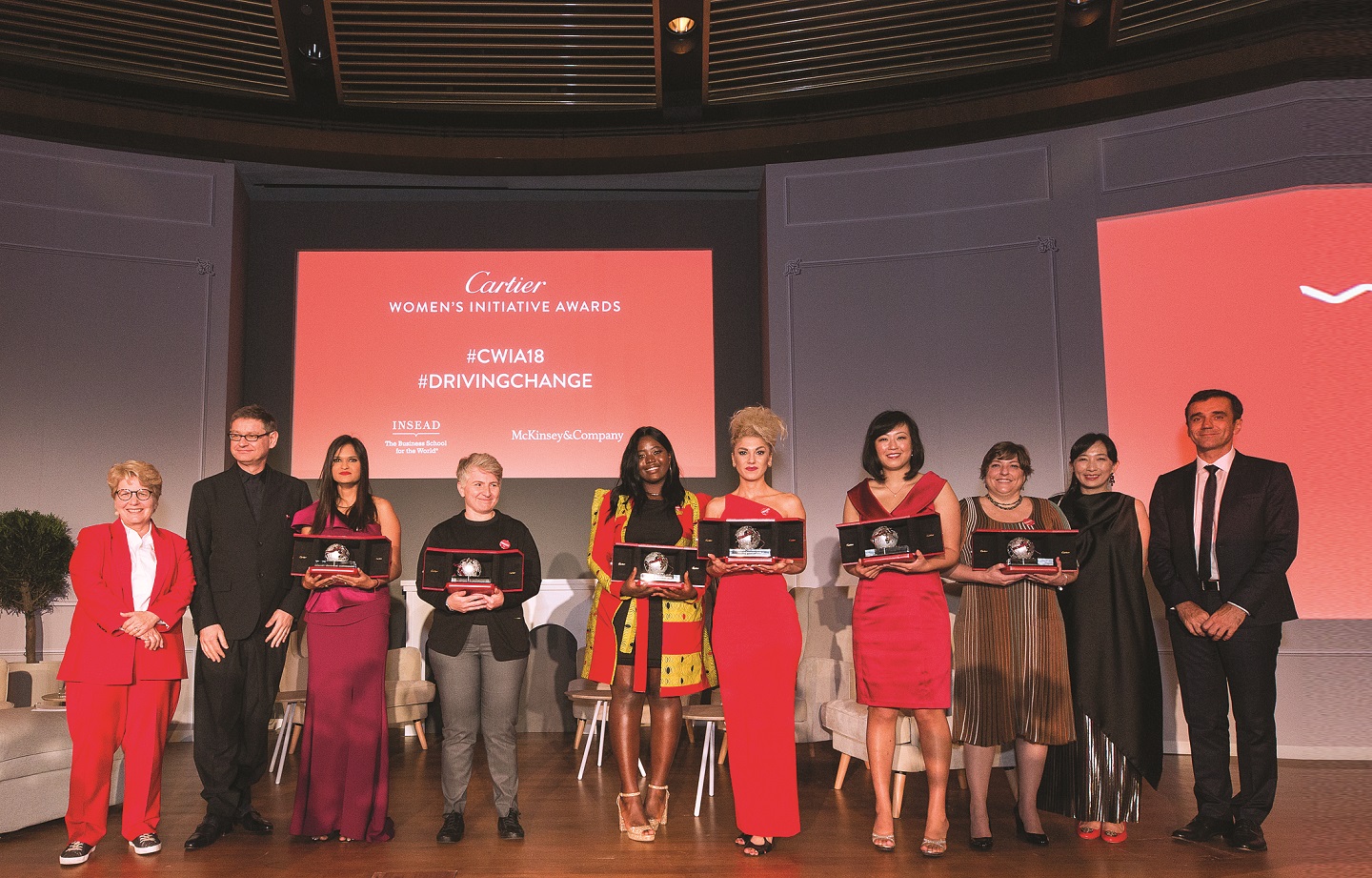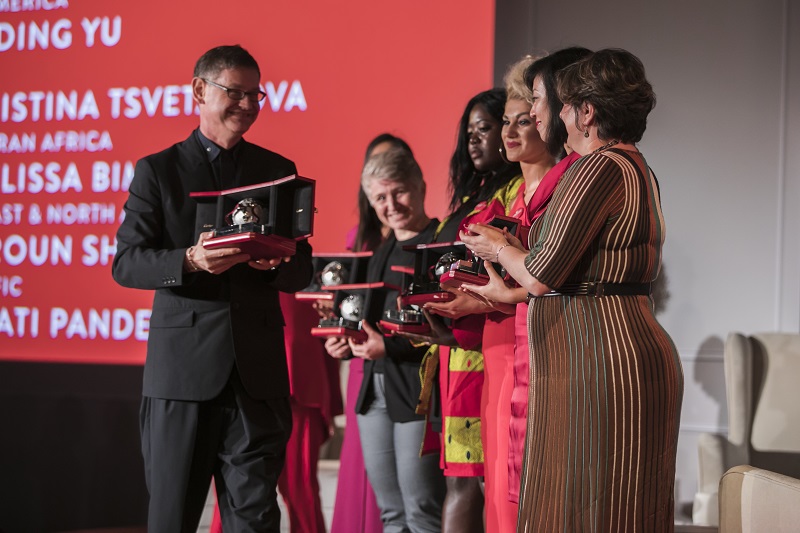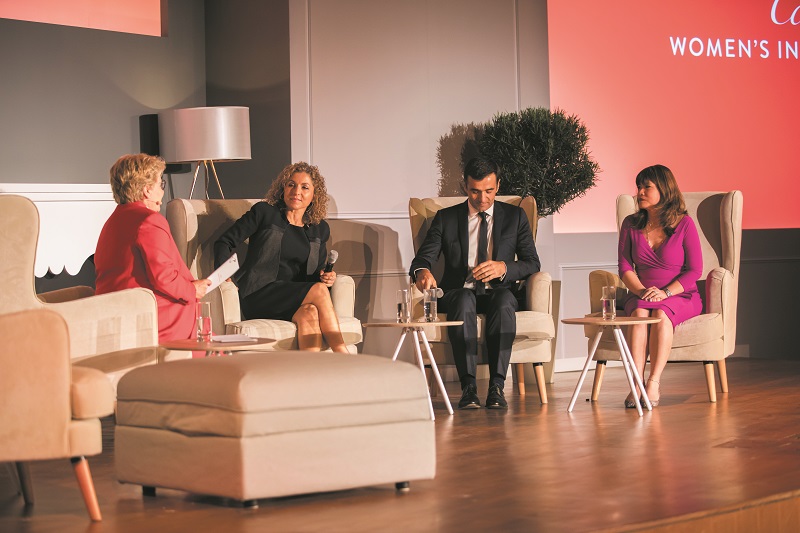
The winners of the 2018 Cartier Women’s Initiative Awards.
Prof Ilian Mihov takes to the stage, ready to talk about the under-representation of women in technology and entrepreneurship. “Please stop me if I talk for too long,” jokes the dean and Rausing Chaired Professor of Economics at graduate business school INSEAD Singapore.
“Don’t worry, I have no trouble keeping men quiet,” Sandi Toksvig says, deadpan. The comedian, broadcaster and gender equality champion is the co-founder of the Women’s Equality Party in the UK — in short, a more fitting host of the Cartier Women’s Initiative Awards 2018 would be hard to find. Along with the hall full of women gathered at The Capella in Singapore, Mihov laughs before proceeding to cite dismal statistics, such as how only one in 10 venture capital dollars goes to women.
Represented in this hall are some of the women who have fought hard to earn those minimal investments allocated to them. The awards, now in its 12th year, received a record 2,800 applications from female entrepreneurs around the globe, including, for the first time, participants from Austria, Cameroon and Pakistan. The 18 finalists present hail from sectors such as health, environment, education, culture, electronics and technology. They are cheered on by representatives of non-profit media organisation TED — a new partner of the awards — guest speakers and journalists present to recognise women-run, for-profit businesses working to create strong social impact.
Cartier exemplifies its dedication to women empowerment with lucrative rewards — the winning laureates are presented US$100,000 (about RM398,000) funding and a year’s coaching from INSEAD and McKinsey & Co. A new recognition for runners-up sees the remaining finalists receive US$30,000 each in financing.

Gingger Shankar, the only woman in the world who has mastered the double violin, performs a moving piece from Akicita: The Battle of Standing Rock, a Sundance Film Festival documentary chronicling the resolute opposition against the construction of a multibillion-dollar oil pipeline on Native American lands in North Dakota, the US. The grandniece of sitarist Ravi Shankar, she produced and composed the documentary’s music.
“Representation matters for children struggling to find their voice, and I didn’t see anyone who looked like me in the mainstream media,” she says. “When I began seriously pursuing music, I wasn’t doing it just for myself. I was representing my mother, my grandmother, women before and after me. All these strings sing together to create a chorus of voices, just like the double violin. And when I heard about Standing Rock, when I saw the Native Americans fighting for their rights and people pushing them back because they didn’t want to hear their voices, I was angry. Akicita amplifies their voices. If oppressors won’t open the doors, let’s set those doors on fire.”
Her performance is sandwiched between talks by TED speakers Zubaida Bai, founder of reproductive health venture ayzh; Meagan Fallone, CEO of Barefoot College, which trains rural and illiterate women in dozens of countries to be solar engineers; Matilda Ho, an emerging voice on food sustainability in China; and Halla Tómasdóttir, the first female CEO of Iceland’s Chamber of Commerce and a recent presidential candidate.
The stage rings with authority and passion as one formidable woman after another — composed, earnest, fiery — takes the mic. The finalists are introduced in formats, including video stories, live sharing and Dare to Fail talks, where relevant nominees talk about how failure drove them to succeed.
Kristina Tsvetanova, a mechanical engineer who created the first tactile e-tablet for the visually impaired, was among the latter. Braille publications are costly to produce, so she invented Blitab, a US$500 tablet that converts text into tiny liquid dots that rise from tablets to be read by touch or as an audio document. “My best friend is blind and I did this for him before realising that a product I developed as a solution was also a business opportunity. Accessibility is important. What is the point of having millions of publications when only 1% of published books are in Braille? Why should anyone living in the 21st century be denied access to literature?”

“Looking at these women makes you wonder what you’re doing with your life,” Cyrille Vigneron, CEO of Cartier, says in a later interview at the St Regis Singapore. “That’s why we divide the awards according to region. We don’t discriminate by sectors — many businesses we see are cross-disciplinary — because we didn’t want to constrain ideas of what we could support.”
And Cartier has long been an advocate of empowerment and aid, investing in crisis management and supporting various causes globally, including refugee camps in Bangladesh, clean water programmes in Africa and women’s education in India. The Cartier Philanthropy vehicle has also financed the trips of women from Vietnam, Thailand and Cambodia to train as solar engineers at Barefoot College.
That’s why we divide the awards according to region. We don’t discriminate by sectors — many businesses we see are cross-disciplinary — because we didn’t want to constrain ideas of what we could support
“Statistics on the discrimination women face are not new,” continues Vigneron. “There are many platforms for entrepreneurs, but men acquire most of the finances. So, it only makes sense to have these women-only entrepreneur awards. Now that the award is sufficiently well established and has credibility, it increases the confidence of banks in investing in these enterprises. These projects come from very concrete ideas. The laureates are not trying to find new spaceships to colonise Mars. They are addressing real community issues. If we allocate money to women doing beautiful things concretely, we can change the course of things on this planet and not try to escape from it. As a man sitting in that room, I found the surrounding energy, power and strength very touching. I feel like I have a responsibility to support these causes.”
The ventures are indeed impressive in their idea, execution and potential for scale. Erin Keaney, the American founder of Nonspec, produces prosthetic limb kits for amputees at under US$200; Julia Romer of Germany invented an electricity-independent refrigerator under her company, Coolar, for storage of vaccines in remote regions; and Cameroonian Melissa Bime is behind Infiuss, a digital supply chain platform that operates a database of blood types available in connected hospitals and transports blood to patients in need. Each story comes from a personal place and shares a common thread — the women took on these causes because they were driven by empathy and a sense of responsibility to their families, friends or communities. There were gasps, laughter, tears and applause as they related the gruesome, dismal or sad encounters that motivated their enterprises.
Toksvig returns to the stage visibly teary after all the finalists had finished their stories. “I’m having a heck of an evening,” she says, preparing to announce the winners. “I’m crying, I’m laughing. It’s a heck of an evening.”
Cartier Women’s Initiative Awards 2018 winners
ASIA-PACIFIC: Swati Pandey, India
Arboreal Agro Innovations
An industrial scale, vertically integrated producer of stevia, a 100% natural substitute for sugar
EUROPE: Kristina Tsvetanova, Austria
Blitab Technology
A tactile tablet for the blind and visually impaired
LATIN AMERICA: Paula Gomez, Brazil
Epistemic
A device that alerts patients and caregivers of an oncoming epileptic seizure up to 25 minutes in advance
MIDDLE EAST & NORTH AFRICA: Siroun Shamigian, Lebanon
Kamkalima
An online platform that uses artificial intelligence and data analytics to help one learn and teach Arabic
NORTH AMERICA: Yiding Yu, The US
Twiage
A digital platform that enables the transmission of real-time data from ambulance to hospital
SUB-SAHARAN AFRICA: Melissa Bime, Cameroon
Infiuss
An online blood bank that collects and dispatches blood donations to hospitals
Applications for the 2019 Cartier Women’s Initiative Awards are now open.


